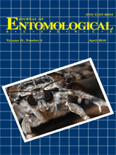
JOURNAL OF ENTOMOLOGICAL SCIENCE
Scope & Guideline
Unraveling the Complexities of Insect Life
Introduction
Aims and Scopes
- Insect Taxonomy and Systematics:
The journal publishes studies on the identification, classification, and phylogenetic relationships of insect species, contributing to the understanding of biodiversity and evolutionary relationships among insects. - Ecology and Behavior of Insects:
Research on the ecological interactions of insects, including their roles in ecosystems, behavior, and adaptations to environmental changes, is a significant focus area. - Insect Physiology and Molecular Biology:
Articles that delve into the physiological processes, biochemical pathways, and molecular genetics of insects, enhancing our understanding of their development, behavior, and responses to environmental stressors. - Integrated Pest Management (IPM):
The journal emphasizes studies that explore innovative and sustainable pest management strategies, including the use of biological control agents, insecticides, and cultural practices. - Entomopathogens and Biological Control:
Research on the use of natural enemies, such as parasitoids, predators, and pathogens, for controlling insect pests is a core area of publication. - Insect-Plant Interactions:
Studies focusing on the relationships between insects and plants, including herbivory, pollination, and plant defense mechanisms, are frequently featured. - Insect Conservation and Biodiversity:
The journal also addresses issues related to the conservation of insect species and their habitats, highlighting the importance of insects in ecological health and biodiversity.
Trending and Emerging
- Molecular Entomology and Genomics:
There is a significant increase in studies employing molecular techniques, such as transcriptomics and gene expression analysis, to understand insect biology and their interactions with the environment. - Sustainable Pest Management Practices:
Research focusing on sustainable pest management, including the use of biopesticides, natural enemies, and integrated approaches, has become increasingly prominent as researchers seek environmentally friendly alternatives to chemical pesticides. - Climate Change Impacts on Insects:
Emerging studies are exploring the effects of climate change on insect populations, behaviors, and distributions, highlighting the urgent need to understand how global changes affect insect ecology. - Insect Responses to Environmental Stressors:
Research examining how insects respond to various stressors, including pollutants and climate variability, is gaining importance, particularly in the context of ecosystem health. - Insect-Related Public Health Issues:
An increasing number of publications are addressing the role of insects in public health, particularly vectors of diseases and their management, reflecting heightened awareness of their impacts on human health.
Declining or Waning
- Conventional Chemical Insecticides:
There has been a noticeable decline in studies focused solely on conventional chemical insecticides. This shift may be due to a growing interest in sustainable and eco-friendly pest management practices. - Invasive Species Management:
Research specifically targeting the management of invasive insect species has decreased, possibly overshadowed by broader studies on biodiversity and ecosystem health. - Traditional Taxonomic Studies:
While taxonomic research is still important, the focus on traditional morphological descriptions without molecular methods appears to be declining, as molecular techniques become more prevalent in species identification.
Similar Journals
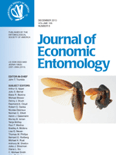
JOURNAL OF ECONOMIC ENTOMOLOGY
Connecting Entomology with Real-World ApplicationsJOURNAL OF ECONOMIC ENTOMOLOGY, published by OXFORD UNIV PRESS INC, stands as a premier interdisciplinary platform for researchers and professionals in the realms of entomology and ecological sciences. With a robust publication history dating back to 1945, this esteemed journal has consistently maintained its reputation for disseminating high-quality research, as evidenced by its prestigious Q1 rankings in both Ecology and Insect Science for 2023. The journal’s impact is highlighted by its excellent Scopus ranks, placing it in the top percentile of Agricultural and Biological Sciences and Environmental Science categories. Aimed at advancing the understanding of insects and their relationships with humans and ecosystems, the JOURNAL OF ECONOMIC ENTOMOLOGY offers a critical forum for original research articles, reviews, and opinion pieces that influence practices in pest management, conservation, and agricultural productivity. Although not an Open Access journal, its findings are pivotal for students, researchers, and professionals striving to address contemporary challenges in entomology and beyond.
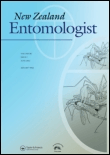
NEW ZEALAND ENTOMOLOGIST
Unveiling the Secrets of Insect Biology and EcologyNEW ZEALAND ENTOMOLOGIST, published by Taylor & Francis Ltd, is a distinguished journal in the field of Insect Science, featuring a rich history dating back to its initial publication in 1952. As a platform for sharing innovative research and critical insights, this journal serves as a vital resource for entomologists and scientists interested in the diverse aspects of insect biology, ecology, and behavior. Although it currently holds a Q4 category in its discipline with Scopus ranking it at the 163rd out of 181 journals, the NEW ZEALAND ENTOMOLOGIST continues to uphold high-quality standards of peer-reviewed articles that contribute significantly to the understanding of insects, particularly within the unique ecosystems of New Zealand. Researchers and professionals are encouraged to submit their findings to enhance the journal's growing repository of knowledge, while students will find a wealth of information to aid their studies and foster their interest in entomological research.

JOURNAL OF INSECT SCIENCE
Championing Open Access in Insect ScienceJOURNAL OF INSECT SCIENCE, published by OXFORD UNIV PRESS INC, stands as a pivotal platform in the field of insect science, offering open-access research since 2001. With an impactful presence in the academic community, this journal spans the convergence of entomology and various interdisciplinary studies, establishing itself in the Q2 quartile for both Insect Science and Medicine (miscellaneous) categories as of 2023. This esteemed journal is recognized for its contributions to the understanding and management of insect biology, ecology, and their implications for agriculture and human health, garnering a Scopus rank of 44 out of 181 in Agricultural and Biological Sciences. The Open Access model encourages wide dissemination of knowledge, making the rich repository of research accessible to a global audience. With ongoing publications until 2024, JOURNAL OF INSECT SCIENCE serves as an essential resource for researchers, professionals, and students seeking to deepen their understanding of the crucial role insects play in our ecosystem.
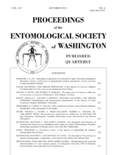
PROCEEDINGS OF THE ENTOMOLOGICAL SOCIETY OF WASHINGTON
Fostering Innovative Research in EntomologyProceedings of the Entomological Society of Washington is a distinguished journal dedicated to the field of entomology, published by the Entomological Society of Washington. With a rich history dating back to 1981 and a commitment to fostering scientific discourse, this journal serves as a vital platform for researchers and professionals specializing in insect science and ecology. It holds a respectable<> impact factor and is categorized in the Q3 quartile in both Ecology, Evolution, Behavior and Systematics and Insect Science, indicating its relevance within the scientific community. Although it does not offer open access, it provides a curated selection of high-quality research articles that significantly contribute to the understanding of insect biology, behavior, and taxonomy. The journal aims to bridge gaps in current research and inspire innovations in entomological studies, making it an essential resource for students, researchers, and practitioners in the field.
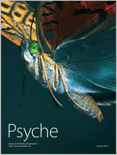
Psyche-A Journal of Entomology
Exploring the Intricacies of Insect LifePsyche-A Journal of Entomology is a distinguished open-access journal published by Hindawi Ltd, specializing in the field of entomology, including aspects of ecology, evolution, behavior, and systematics of insects. Established in 1874, this journal has a rich history of contributing to the scientific community by disseminating high-quality research related to insects and their diverse interactions within ecosystems. With an impact factor placing it in Q3 for both Ecology, Evolution, Behavior and Systematics and Insect Science, Psyche serves as a pivotal platform for researchers, professionals, and students aiming to deepen their understanding of insect-related science. The journal's commitment to open access ensures that research is accessible to a global audience, promoting collaboration and innovation in entomological studies. Covering a broad timeline of converged years from 1874 to 2024, Psyche fosters a comprehensive dialogue around insect biodiversity, conservation, and the ever-evolving dynamics of ecosystems in which insects play crucial roles.
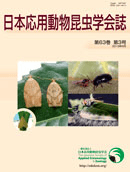
JAPANESE JOURNAL OF APPLIED ENTOMOLOGY AND ZOOLOGY
Diving Deep into the World of Insects and BiodiversityJapanese Journal of Applied Entomology and Zoology is a premier publication in the field of Insect Science, offering a platform for researchers and practitioners to share their findings on applied entomology and zoology. Established in 1957 and published by the Japan Society of Applied Entomology and Zoology, this journal aims to foster the understanding of insect-related studies that impact agriculture, ecology, and biodiversity. With an ISSN of 0021-4914 and E-ISSN of 1347-6068, it serves as a crucial resource for both academics and industry professionals. While the journal currently resides in the Q4 category of the Scopus ranking for Insect Science with a percentile of 11th, it plays a significant role in providing valuable insights into insect behavior, systematics, and their ecological roles. Readers can benefit from its published research to drive innovations and solutions in pest management and conservation practices. As the journal continues to evolve, it reinforces its commitment to disseminating critical research that supports sustainable practices in entomology and zoology through its convergence extending to the year 2024.

TURKIYE ENTOMOLOJI DERGISI-TURKISH JOURNAL OF ENTOMOLOGY
Connecting Science and Agriculture through EntomologyTURKIYE ENTOMOLOJI DERGISI - TURKISH JOURNAL OF ENTOMOLOGY is a distinguished journal published by the Entomological Society of Turkey in collaboration with Ege University, dedicated to advancing the field of insect sciences. With an ISSN of 1010-6960 and E-ISSN 2536-491X, this journal plays a pivotal role in disseminating groundbreaking research in entomology, particularly focusing on the diverse aspects of insect biology, ecology, and their applications in agriculture. As a member of the Q3 category in Insect Science according to the 2023 quartiles, it ranks in the 40th percentile of its field, indicating its growing influence and importance within the scientific community. The journal's scope encompasses innovative research findings, reviews, and short communications that contribute to the understanding and management of insect species. While not currently open access, it serves as a vital resource for researchers, professionals, and students seeking to stay informed about the latest developments in entomology from Turkey and beyond, with a commitment to maintaining high scholarly standards through rigorous peer review processes.
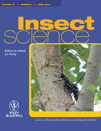
Insect Science
Innovating research in agronomy and insect ecology.Insect Science, published by WILEY, stands as a prestigious journal in the realms of Agronomy, Biochemistry, Genetics, and Insect Ecology. The journal, with ISSN 1672-9609 and E-ISSN 1744-7917, has firmly established itself as a significant resource for researchers and professionals seeking to explore the intricate dynamics of insects and their crucial roles in ecosystems. With a remarkable impact factor placing it in the Q1 quartile across multiple categories, including Ecology and Evolution and Agronomy and Crop Science, Insect Science ranks impressively at #8 out of 181 in the realm of Insect Science on Scopus, showcasing its influence and relevance in the field. Spanning its coverage from 1994 to 2024, this journal invites contributions that advance our understanding of insect biology, behavior, and their interactions within agricultural contexts. The commitment to high-quality research and its role in fostering interdisciplinary dialogue make Insect Science an essential platform for scholars and practitioners at the forefront of insect-related studies.
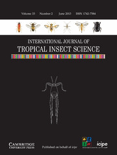
INTERNATIONAL JOURNAL OF TROPICAL INSECT SCIENCE
Fostering Dialogue in Insect Biology and EcologyINTERNATIONAL JOURNAL OF TROPICAL INSECT SCIENCE, published by Springer International Publishing AG, is a leading interdisciplinary journal dedicated to advancing knowledge in the fields of insect science and ecology. With its ISSN 1742-7584 and E-ISSN 1742-7592, this journal provides a platform for researchers to publish high-quality, peer-reviewed articles that explore various aspects of tropical insect biology, behavior, and their ecological impacts. As evidenced by its Q3 ranking in both Ecology, Evolution, Behavior and Systematics and Insect Science, it plays a vital role in fostering scientific dialogue and innovation within these disciplines. Researchers affiliated with the journal benefit from its visibility and growing impact, as demonstrated by its Scopus ranks, with a percentile standing of 61st in Insect Science. Although the journal is not open access, it still reaches a wide academic audience, making significant contributions to our understanding of tropical ecosystems. Situated in Switzerland, this journal is crucial for students, professionals, and researchers invested in the intersection of entomology and ecological science.
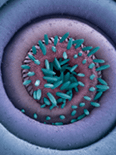
Annual Review of Entomology
Unraveling the Mysteries of Insect BehaviorAnnual Review of Entomology, published by Annual Reviews, is a premier journal dedicated to advancing the understanding of entomology through comprehensive review articles from leaders in the field. With a focus on Ecology, Evolution, Behavior, and Systematics and Insect Science, the journal ranks in the top quartile (Q1) as of 2023, reflecting its significant impact and relevance in these disciplines. Based in the United States, the Annual Review of Entomology has been a trusted resource since its inception, providing critical insights that inform research, policy, and education in entomology. Researchers and professionals will find valuable reviews that synthesize current knowledge and highlight future directions in insect research. The journal's impressive standing, as indicated by its rankings—first in both Agricultural and Biological Sciences categories—emphasizes its pivotal role in shaping scientific discourse and innovation.